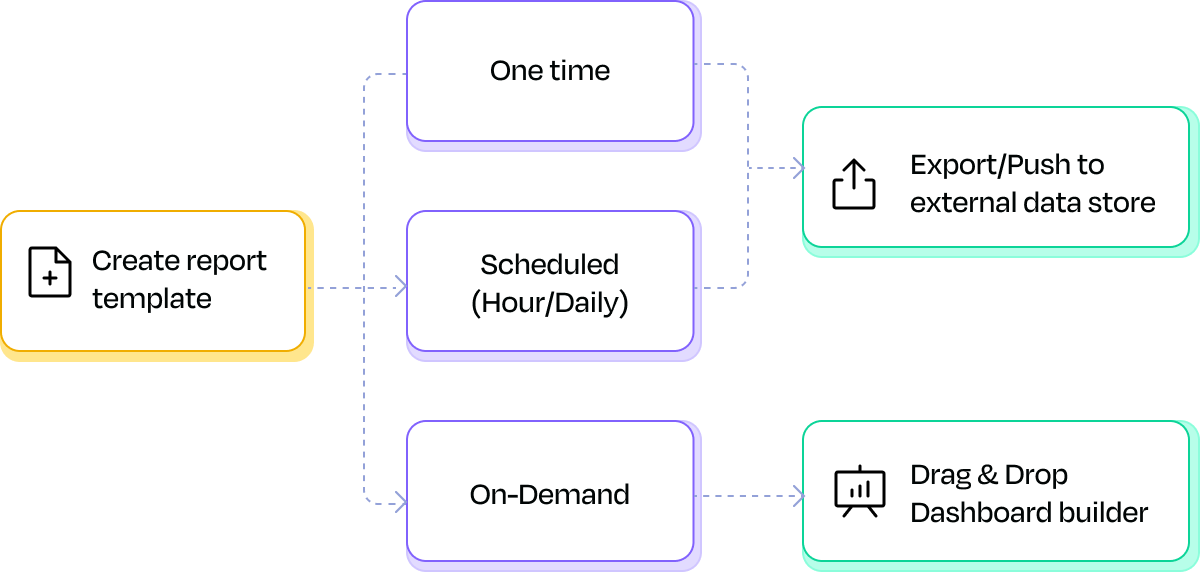How reporting works in Togai?
Togai has an extensive reporting capability that allows you to create reports and report templates. These can be used to generate ad hoc one-time reports for download or pushed to an external data source. Customers can also set up scheduled reports that can be auto-generated hourly, daily or monthly and exported or sent to an external data source.
How reports work in Togai
Tables and entities
Accounts
| Field Name | Type | Description |
|---|---|---|
| account_id | String | The unique identifier of the account. |
| customer_id | String | The unique identifier of the customer. |
| name | String | The name of the account. |
| created_at | LocalDateTime | The date and time when the account was created. |
| invoice_currency | String | The currency of the account. |
| primary_email | String | The primary email of the account. |
| tags | String[] | The tags of the account. |
Customers
| Field Name | Type | Description |
|---|---|---|
| id | String | The unique identifier of the customer. |
| name | String | The name of the customer. |
Events
| Field Name | Type | Description |
|---|---|---|
| event_id | String | The unique identifier of the event. |
| account_id | String | The unique identifier of the account. |
| customer_id | String | The unique identifier of the customer. |
| event_source_time | LocalDateTime | The date and time when the event occurred. |
| ingestion_status | String | The ingestion status of the event. |
Invoices
| Field Name | Type | Description |
|---|---|---|
| id | String | The unique identifier of the invoice. |
| owner_id | String | The unique identifier of the owner. |
| total_amount | Number | The total amount of the invoice. |
| status | String | The status of the invoice. |
| due_date | LocalDateTime | The date and time when the invoice is due. |
| class | String | The class of the invoice. |
| created_at | LocalDateTime | The date and time when the invoice was created. |
License Entries
| Field Name | Type | Description |
|---|---|---|
| account_id | String | The unique identifier of the account. |
| license_id | String | The unique identifier of the license. |
| effective_from | LocalDateTime | The date and time when the license became effective. |
| quantity | BigDecimal | The quantity of the license. |
| created_at | LocalDateTime | The date and time when the license was created. |
Usage
| Field Name | Type | Description |
|---|---|---|
| account_id | String | The unique identifier of the account. |
| customer_id | String | The unique identifier of the customer. |
| billable_id | String | The unique identifier of the billable. |
| event_time | LocalDateTime | The date and time when the usage event occurred. |
| usage_units | String | The usage units of the usage event. |
Revenue
| Field Name | Type | Description |
|---|---|---|
| account_id | String | The unique identifier of the account. |
| customer_id | String | The unique identifier of the customer. |
| revenue_time | LocalDateTime | The date and time when the revenue occurred. |
| revenue_invoice_currency | String | The currency of the revenue. |
| billable_id | String | The unique identifier of the billable. |
| revenue_base_currency | String | The base currency of the revenue. |
Supported functions
Supported aggregations
Supported relative operators
Report templates
Togai also provides an on-demand reporting template option which can be used to create a custom dashboard with various drag & drop widgets that can be used for business analytics to take data driven decisions around pricing.
Report templates and dashboard

